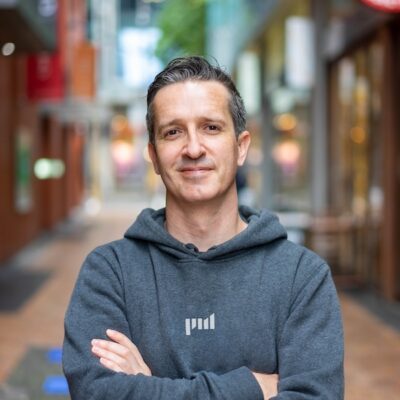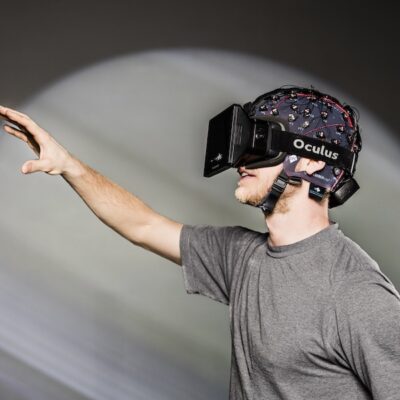Confessions of a health tech entrepreneur
Richard Little is an inventor making traction in the treatment of chronic pain and other neurological conditions without the use of pharmaceuticals. Here he shares his lessons and advice for […]
Richard Little is an inventor making traction in the treatment of chronic pain and other neurological conditions without the use of pharmaceuticals. Here he shares his lessons and advice for health tech entrepreneurs.
Entrepreneurship is not a career path known for stable and steady progression. From crying in the Koru Lounge to pioneering the largest clinical trial of its kind, Richard Little’s career has seen massive breakthroughs and steep learning curves.
He walks in two worlds every day – the world of neuroscience, engineering, prototypes, and then the world of an entrepreneur hustling to secure financial backing. He has a unique perspective as a pragmatic inventor who has decades of experience in business.
Richard sat down with NZBusiness to share his lessons, his advice on fundraising, and his observations on how New Zealand compares with other countries in terms of supporting and encouraging health tech entrepreneurs.
NZB: Where does your problem-solving instinct come from? Is it something you’ve always had?
Richard: I’m an engineer, designer and inventor by DNA. It’s not something I chose to do, but rather who I’ve always been. This led me into a long career in engineering where I’ve worked in all aspects of engineering over the years and now I apply those learnings and skills to try to solve very human problems.
My problem-solving instinct is driven by my desire to help people who are struggling with illness or recovering from an injury. My mind often turns to how I might be able to make things a bit better for them.
About 20 years ago my mum suffered a stroke and my best friend was diagnosed with multiple sclerosis. I hated the way chronic conditions like those could be so debilitating with people struggling with everyday things and potentially becoming isolated from their friends and family. While I was unable to ‘fix’ their conditions, I decided to use what skills I already had to help where I could. At first, I built railings and ramps to help my mum get into her house more easily and it eventually escalated to designing robotic legs.
NZB: Tell us about your two biggest inventions to date – the Rex and the Axon headset.
Richard: After my best friend Robbie Irving was diagnosed with multiple sclerosis we decided to develop robotic technology for people with mobility impairments, we wanted people to be able to exercise in an upright position and even to be able to stand and walk out of their wheelchairs.
Robbie and I then co-founded Rex Bionics in 2007, and our flagship product was a robotic exoskeleton that gave people who had lost the use of some or all of the function of their legs the ability to walk again. Rex listed on the UK AIM Stock Exchange in 2014 before being sold to private investors, at which point I moved on.
Through my work on Rex, I became more and more intrigued with the relationship between the biomechanics of the body and the neuroscience of the brain. To put Axon simply, it is a headset that reads the bio-electrical activity associated with pain in a user’s brain and sends the data wirelessly to a mobile device in real-time. As they wear the headset, the participant undertakes exercises in the form of simple animated games played on a tablet or smartphone.
These exercises reward and reinforce positive change in the brain’s electrical activity. By using the Axon system on a regular basis (about 30 minutes per day, several days per week, over the course of several weeks), the patient learns to ‘retrain’ how their brain perceives and responds to pain. This process is called “neuromodulation” and there is growing evidence of its effectiveness across a range of treatment areas, including chronic pain management, stroke rehabilitation, anxiety and depression.
We recently completed a trial of our Axon device in New Zealand, which is the world’s largest ever clinical trial of EEG neurofeedback for managing chronic pain. We’ll soon be releasing the results later this year and interim results show statistical and clinical improvements in our patients’ chronic pain. In 2023, we’re also planning preliminary trials to test the efficacy of Axon in the diagnosis and treatment of anxiety and multiple sclerosis and well as developing new technology and science for the treatment of alzheimers.
NZB: If you met a young tech entrepreneur today what general advice would you have for him/her to make the way forward easier and faster?
Richard: It’s so important to know your ‘why’. To feel satisfied about my work, I need to be doing something constructive, helpful and to the service of others. I want to use my skills to improve the lives of people who are in pain and ultimately improve their quality of life.
When the work gets tough and I’m running on little sleep, worrying about whether we can turn our dream into a reality for the millions of chronic pain sufferers around the world, that fire in my belly gets me through the most uncertain and difficult times.
I believe that as we only get 30 odd thousand days on this earth (if we are lucky) I might as well spend them doing something useful.
Your reason for getting out of bed every morning may be different to mine. But whatever it is, remind yourself of it every single day.
NZB: Specifically around raising funding – are there any tips you can provide to again expedite the process both here in New Zealand and overseas?
Richard: My biggest piece of advice for raising funding is to take any opportunity to connect with others, because you never know where it may lead you.
When I was first seeking investment into Axon, I went down the typical start-up route through using my own resources, and a few colleagues and friends. Typically, the usual next step is to tap into the New Zealand angel/VC community and build things from there.
But this changed when a few years ago, on an overseas business trip I had a chance meeting in an airport lounge with an investment banker. This banker later introduced me to entrepreneur and investor, Yalman Khan, and this eventually led to Yalman becoming an Exsurgo director and garnering investor support from high-net-worth individuals and family offices in the UAE region.
By taking the chance to talk to a stranger and share my grand plans for Axon and ridding the world of chronic pain, I’ve been able to leapfrog some of the usual funding ‘stepping stones’ and get serious backing from ambitious investors.
Ensure you have your elevator pitch up your sleeve for a moment’s notice.
NZB: What other lessons can you share from your own journey so far?
Richard: That it’s important to surround yourself with a team of people with both a shared purpose and different backgrounds. My team shares a common goal to improve the lives of people who struggle every day and to end human suffering with the use of technology.
While we share this goal, we come from different disciplines and backgrounds. For example, our CTO Faisal Almesfer has held key positions in the development of robotic rehabilitation and physical therapy devices, while our CSO Christine Ozolins is a trained psychologist and neuroscientist with almost a decade’s academic research in the field of EEG neurofeedback.
With an issue as complex as chronic pain and neurological conditions, you need to approach it with different lenses and perspectives to develop a solution that’s going to work.
NZB: From your observations, how does New Zealand compare with other countries in terms of supporting and encouraging health tech entrepreneurs?
Richard: I believe New Zealand has a unique advantage to become world leaders in health technology. In recent years the sector has been growing rapidly and according to a report by Technology Investment Network (TIN) it was the largest and fastest-growing sector in 2020.
Like many New Zealand health-tech start-ups who are new on the scene, our ambitions are to achieve success on home soil, while capitalising on larger global opportunities to ensure the growth and sustainability of our business in New Zealand.
Compared to other countries like the United States, in New Zealand we’re able to conduct world-leading research and development at a much lower cost. In the case of Exsurgo, this meant we could run and complete our successful clinical trial with AUT and WDHB, and the results will give our Axon device more credibility as it rolls out globally.
Government is also undertaking significant health system reforms, including the aspiration to develop Digital Health Hubs. Once established, I believe this will only add to New Zealand’s competitive advantage and help attract world-class talent and expertise to eventually establish global centres of excellence.






